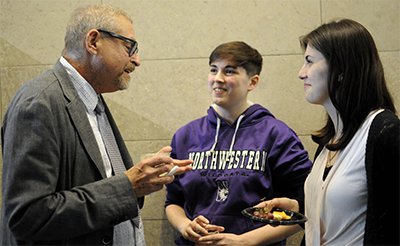
Students and faculty attended a presentation by David Ostrow, MD, PhD, a leader in lesbian, gay, bisexual, and transgender (LGBT) health on March 30 as part of a new lecture series, Diverse Perspectives of Physician Scientists.
Hosted by the Medical Scientist Training Program (MSTP) Student Council, the lecture series aims to foster conversations between researchers and current trainees and share the experiences of those who identify as an underrepresented minority and/or serve populations where health disparities exist.
“We strive to offer new perspectives for students of all backgrounds as we move forward in our training and careers,” said Anthony Gacita, a first-year MSTP student and organizer of the event. “Physician scientists have a unique role in treating patients from underserved populations – they not only treat patients but they also can drive research that benefits those populations. We hope that Diverse Perspectives of Physician Scientists will expose current trainees and faculty to ways to target underserved populations in their clinical and laboratory work.”
Dr. Ostrow discussed his career and research on the determinants of risk, sexual and drug use behaviors and effective risk-reduction strategies for the prevention of HIV transmission. A senior investigator for the Cannabinoid Therapies Translational Research Project, he is also working to develop cannabinoid-based therapeutic regimens for the prevention and treatment of HIV infection.
In addition to discussing policy challenges as a physician and researcher he has faced, he advised students to find their passion.
“You have to have a passion for something, whether it comes from your own life or your experience with patients or society,” Dr. Ostrow said. “You wouldn’t be in this field of training if you didn’t have something driving you and that gave you the momentum and energy to pick yourself up after you don’t get a grant approved or don’t get promoted and start all over again.”
A reception followed the lecture where attendees had a chance to talk with Dr. Ostrow.
“Listening to Dr. Ostrow was fascinating, and I liked learning about how much advocacy goes into policy change and how it affects the LGBT community,” said Katie Kunstman, a first-year medical student. Kunstman is interested in pursuing research in underrepresented populations, specifically how transgender women in Chicago access health information.
The MSTP student council plans to host the next lecture in the series in the fall.






